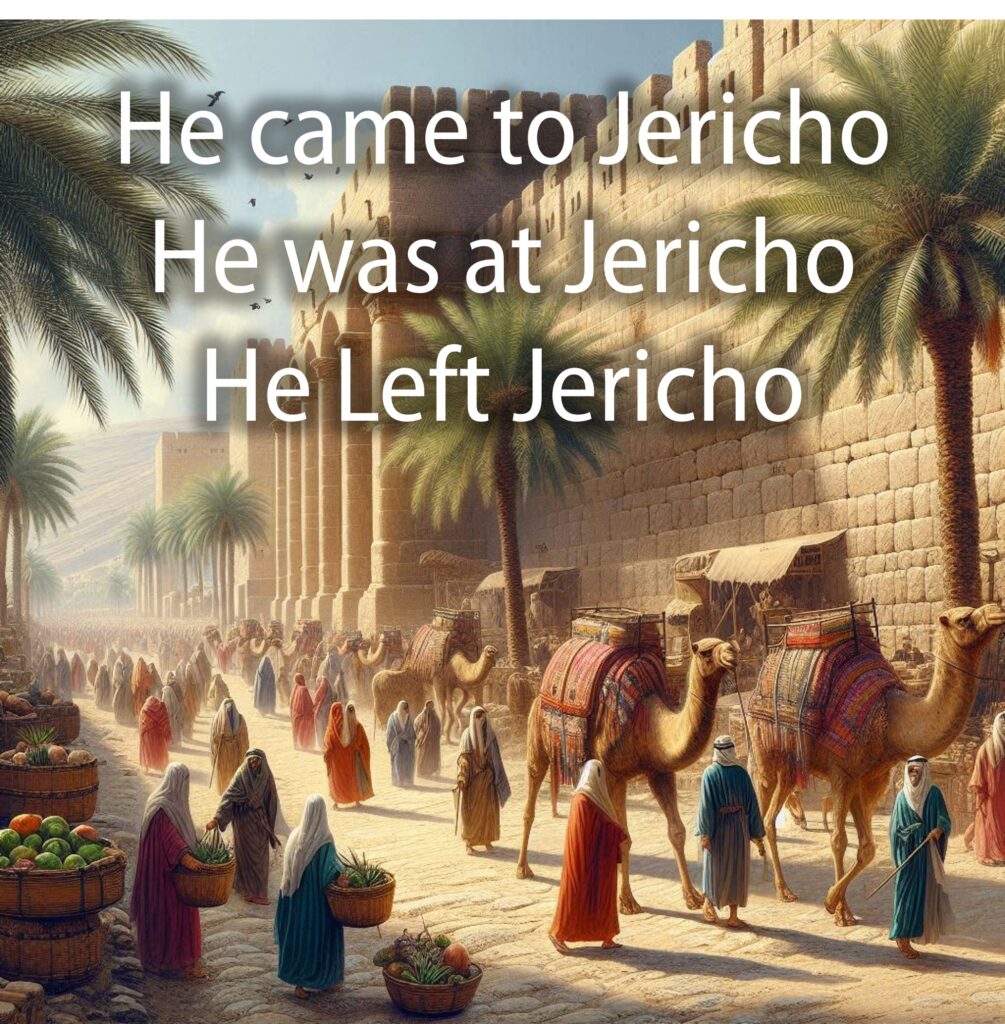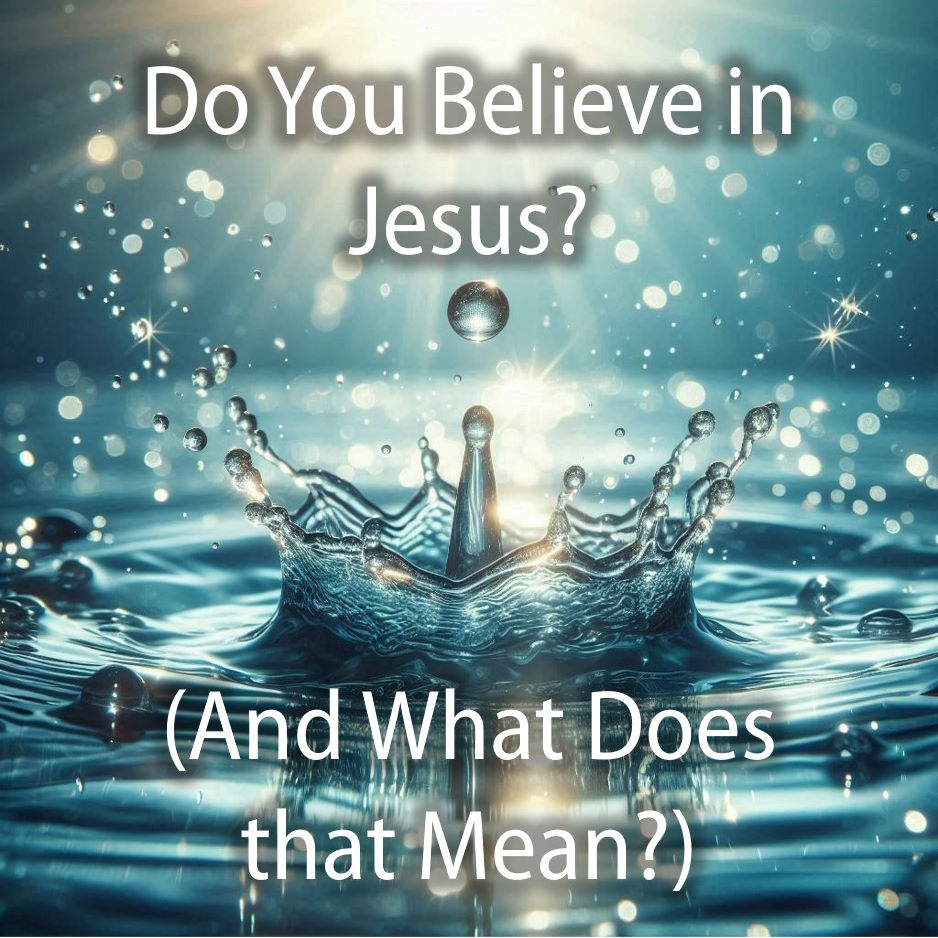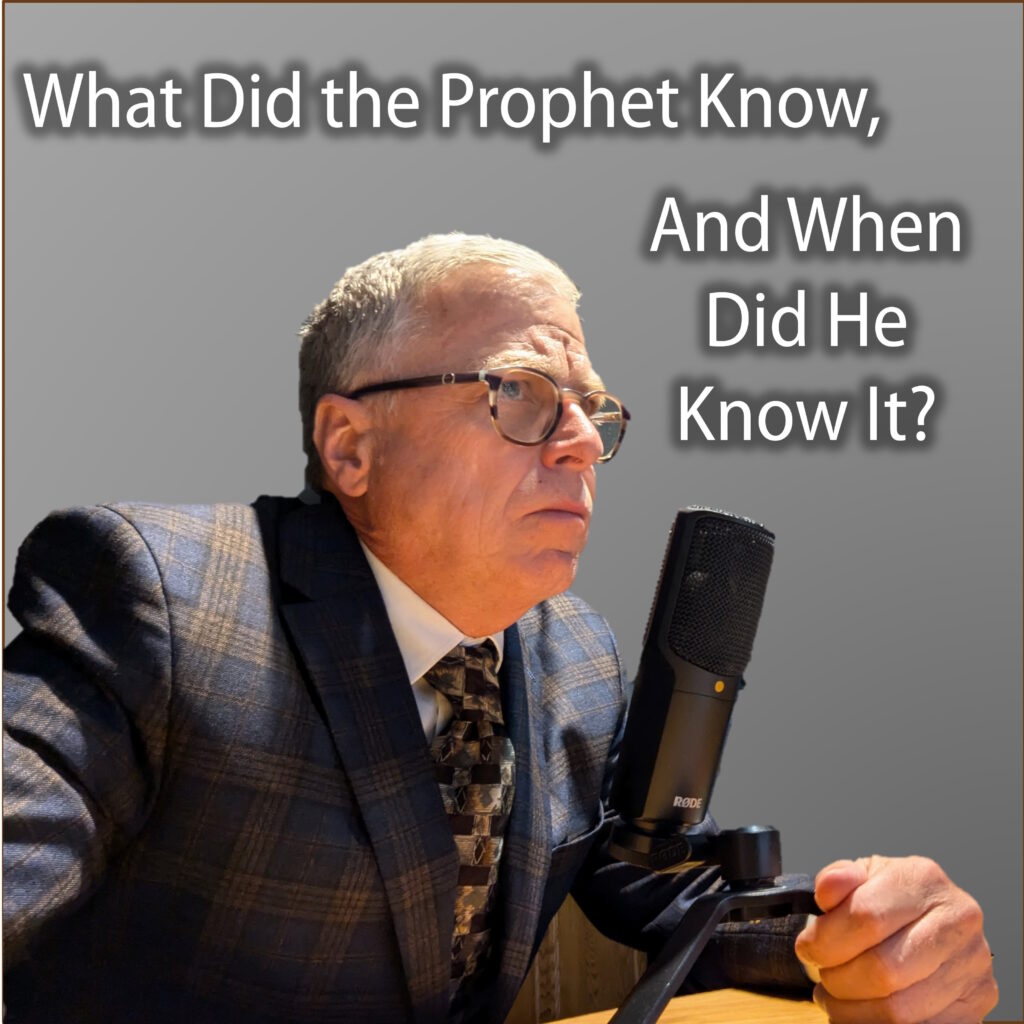Hespeler, Oct 27, 2024 © Scott McAndless – Anniversary Sunday
Job 42:1-6, 10-17, Psalm 34:1-8, Hebrews 7:23-28, Mark 10:46-52
This is anniversary Sunday. Anniversaries are a wonderful opportunity to do three things. We look back at where we have come from. We take stock of where we are now. And we look forward to where it is we will be going from here.
I know that we often have a tendency on days like this to put a lot of emphasis on the first of those three and to celebrate our glorious past. But all three of those things are important. And honestly, the third is the most important of all.
So, I went looking in all of our lectionary readings for this morning to see if I could find something that would help us to do those three things. I finally landed on the opening words of our Gospel reading this morning. “They came to Jericho. As he and his disciples and a large crowd were leaving Jericho…”
Befuddling Verse
They are easy words to skip over, I realize. In between the important stories, the gospel writer seems to be taking a moment to situate us geographically. But where he situates us matters. In just a few words, he tells us where we’ve been, where we are and where we are going.
It is actually a verse that has confused and befuddled many people. It confused, for example, the author of the Gospel of Luke. Luke tells the same story of a healing of a blind man near Jericho, but in Luke’s version, it happened when Jesus was coming to Jericho. And Matthew tells the same story (though in his version there are two blind men) and according to Matthew it happened while Jesus was leaving Jericho. But Mark has this unique version of the story where he highlights where Jesus is coming from, where he is and where he is going. It speaks to us at the nexus of where we are today.
Jericho
Those words, “They came to Jericho,” actually speak volumes. Jericho was not just anyplace. If Jesus came to it on his way to Jerusalem, this was not just a random approach. Jericho was, kind of famously, the first city you encountered when you entered Judea by crossing the Jordan River. When Joshua first entered the Promised Land with the ancient children of Israel, Jericho was the first place that he defeated and conquered. Who could ever forget how “Joshua fit the Battle of Jericho and the walls came a tumbling down.”

If Jesus came to Jericho, it would have been seen as a reenactment of the conquest of the Promised Land. Don’t forget that Jesus’ name in the local language was Yeshua and that was exactly the same name that they would have used for the Old Testament hero called Joshua in Hebrew. Don’t tell me that people didn’t look at Yeshua of Nazareth and see him as a new Yeshua come to reconquer the land for God’s people.
The Baggage We Carry
Now Jesus may not have intended that – or at least he didn’t intend the kind of violent conquest that Joshua is associated with. But whether Jesus saw it that way or not, his approach to Jerusalem would have carried all of that historical baggage.
And as we celebrate our anniversary, it is important for us to take stock of some of the baggage we carry with us. We are moving out of a time when the Christian church dominated over our society. In the past of Western society, the church set the agenda when it came to defining morality, setting the calendar and even driving political issues sometimes.
Positives and Negatives
Now, to be sure, that era brought about a lot of good for society and many benefits to the church. I would certainly never say that it was all bad. But there were times when the church’s dominance led to scenes of conquest. Historically that includes episodes like the Crusades, the wars of religion and many horrors of colonialization. More recently, we have seen the church’s participation in the Residential School system and the persecution of various groups seen as deviant. These are part of the downside of that era in the church’s life.
That era, both the positives and the negatives of it, seems to be over. I know we mourn that ending in some ways. We complain about how society no longer reserves Sunday mornings for our exclusive use. We regret how the church’s positions are no longer afforded automatic respect. But we can’t go back there by just pretending that the world hasn’t changed.
When Jesus came to Jericho in our story this morning it was his last time. He was on his way to Jerusalem where he would die. And so, I would say that coming to Jericho with Jesus involves, to a certain extent, a decision to no longer live in the glorious and triumphalist past.
At Jericho
And then Mark tells us that Jesus was in Jericho. That represents the present moment. And you will note how Mark says nothing about what happened in Jericho. Certainly, the new Joshua did not bring down the walls of the city because Mark would have absolutely mentioned that. Instead, it seems that Jericho is simply a moment of transition. Jesus is trying to get his followers to find a new understanding of what it might mean to conquer the Promised Land in a new way in the name of the kingdom of God.
And we are in a time of transition in the present moment as well. There was a time when we may have thought that we could bring about the kingdom of God on earth by conquering or dominating our society. We thought we could impose our vision of a just and moral society and everyone would understand that it would make everything good. It seems that Jesus is trying to teach us a different way – a way of service and of mission.
Leaving Jericho
And that brings us to the really big question – the question of where we go from here. “As he and his disciples and a large crowd were leaving Jericho, Bartimaeus son of Timaeus, a blind beggar, was sitting by the roadside. When he heard that it was Jesus of Nazareth, he began to shout out and say, ‘Jesus, Son of David, have mercy on me!’”
As Jesus leaves Jericho, he shows us where we go from here. Bartimaeus is somebody who wants to follow Jesus. In fact, did you know that Bartimaeus is the only person in the entire Gospel of Mark who acknowledges Jesus as the “Son of David”? This is an all-important title for Jesus in the Christian tradition. It not only acknowledges Jesus’ descent from the ancient line of kings of Israel, it is the very basis of the other most important title given to Jesus: Messiah or Christ. Son of David was a Messianic title.
An Excellent Disciple
Isn’t it ironic that Bartimaeus, who is blind, is the only one in this gospel who is able to see this significant thing about Jesus? In many ways this makes him a better potential disciple, blind as he is, than any of the twelve and just about any other character in this gospel.
But there is a problem. Despite all that would recommend this man as an excellent disciple of Jesus, he is instead treated as a nuisance and a bother. “Many sternly ordered him to be quiet, but he cried out even more loudly, ‘Son of David, have mercy on me!’”
He is seen as an outsider and not as somebody who could belong. Now, in his case, that almost certainly has something to do with his disability. His blindness means that no one can imagine him being a vital or worthwhile part of this movement going forward.
Rebuking Ablest Attitudes
Jesus’ response to him as a person rather than as an invalid is certainly a rebuke to any of the ablest attitudes we may be tempted to carry into the future of the church. A church that fails to value everybody, in spite of whatever physical or mental or spiritual impediments may be holding them back, is a church that will not thrive in the future that God is calling us to.
But I believe that Bartimaeus has more to say about our future than that. He also represents all of those who we look at and dismiss because we don’t think that they belong.
Cultural Factors
Let’s be honest here. The Presbyterian Church in the past often based its growth on cultural factors. Do you think that it was an accident that our church membership in the past has been dominated by people who came from Scottish, Swiss, Dutch and French Huguenot backgrounds? Is it just by chance that most of our recent growth has come in the form of people from a Korean background? And is it really a big surprise that most of our congregations have been made up from people who came from roughly the same socio-economic demographic?
No, of course not. Those were the people who were made to feel as if they belonged. Anyone who didn’t quite fit in those groups often faced many hurdles that got in the way of them truly belonging to one of our churches – though God bless those who persevered and have become such vital parts of our churches over the decades.
A Strategy that Needs to Change
This was a church growth strategy that made a lot of sense at a time when those communities gave us a nearly limitless supply of people on whom we could draw to build up our churches. But a lot has changed in our society since then. That is why, if we want to see vibrant growth of our churches in the future, we need to start imagining the future of our membership now as something very different from the cultural and socio-economic past.
In the past, when somebody from any sort of different background showed up in our churches, and raised a concern or suggested something that did not fit with our past experiences of the church, what was our response? Honestly, “many sternly ordered him [or her or them] to be quiet,” saying, “we’ve never done it like that before.”
Valuing Outsiders
People did that to Bartimaeus too. And I need to reiterate that Bartimaeus was right! He had indeed seen something about Jesus that no one else had seen! That is why I know for sure that the future of our church and its vibrancy includes valuing not just people from different backgrounds and different demographics, but also those who come with different thoughts and ideas than what we have been used to.
So Bartimaeus has a lot to say to us about the future of our churches. And you will note that we haven’t even gotten to the thing that most people remember about this story – that Bartimaeus was blind, and that Jesus gave him his sight. I tend to understand that as symbolic for the future of the church as well.
Healing the Blind
Jesus’ healing of the blind is never treated as just another of his amazing miracles in the gospels. It is always symbolic of the deeper meaning of Jesus’ work. It illustrates how Jesus is the light of the world and how he has come to enlighten those who may have 20/20 vision but who stumble in the darkness nevertheless.
Bartimaeus shows us that the work of the church as we move forward is to shine the light of truth and of renewal for a world that is often mired in falsehood and willful blindness. We are to proclaim the truth of God’s love for the outsider, God’s commitment to justice for all and to live out a deep commitment to know and to live by what is true. That message is a real eye-opener. If you take it seriously, you will never see the world in quite the same way again.
We are all Bartimaeus
We are all Bartimaeus as we move on from this place and this moment in time. Jesus’ final words to him in this story are, “Go; your faith has made you well.” We must all accept that, if we move on from where we are right now as a church, we do so only by faith and in the full knowledge that Jesus is the one who makes us whole.
Jesus had given Bartimaeus permission. He could have gone anywhere from there. He could have taken the sight he had been given and resumed the life that he had known before. But he did not. “Immediately he regained his sight and followed him on the way.”
Will we do that? Will we follow Jesus into the future to which he calls us? Let us follow with faith, hope and love.




